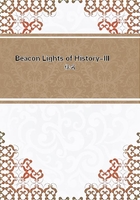
第98章
evil days fell upon them, and persecution was intensified under Henry V. (1413-1422) because of their supposed rebellion. The Lollards under Archbishop Chicheley, as early as 1416, were hunted down and burned as heretics. The severest inquisition was instituted to hunt up those who were even suspected of heresy, and every parish was the scene of cruelties. I need not here enumerate the victims of persecution, continued with remorseless severity during the whole reign of Henry VII. But it was impossible to suppress the opinions of the reformers, or to prevent the circulation of the Scriptures. The blood of martyrs was the seed of the Church. Persecution in this instance was not successful, since there was a noble material in England, as in Germany, for Christianity to work upon. It was in humble homes, among the yeomanry and the artisans, that evangelical truth took the deepest hold, as in primitive times, and produced the fervent Christians of succeeding centuries, such as no other country has produced. In no country was the Reformation, as established by Edward VI. and Elizabeth, so complete and so permanent, unless Scotland and Switzerland be excepted. The glory of this radical reform must be ascribed to the humble and persecuted followers of Wyclif,--who proved themselves martyrs and witnesses, faithful unto death,--more than to any of the great lights which adorned the most brilliant period of English history.
AUTHORITIES.
The Works of Wyclif, as edited by F. D. Matthew; The Life and Sufferings of Wicklif, by I. Lewis (Oxford, 1820); Life of Wiclif, by Charles Wehle Le Bas (1846); John de Wycliffe, a Monograph, by Robert Vaughan, D. D. (London, 1853); Turner's History of England should be compared with Lingard. Mosheim's Ecclesiastical History;Neander's Church History; Wordsworth's Ecclesiastical Biography;Gieseler, Milner, and general historians of the Church; Geikie's English Reformation. A German Life of Wyclif, by Dr. Lechler, is often quoted by Matthew, and has been fortunately translated into English. These is also a slight notice of Wyclif by Fisher, in his History of the Reformation.
The name of the English reformer is spelled differently by different historians,--as Wiclif, Wyclif, Wycliffe, Wyckliffe; but I have selected the latest authority upon the subject, F. D.
Matthew.
End Beacon Lights of History Volume III Part 2by John Lord Volume III.
Part II--Renaissance and Reformation.
CONTENTS.
DANTE.
RISE OF MODERN POETRY.
The antiquity of Poetry The greatness of Poets Their influence on Civilization The true poet one of the rarest of men The pre-eminence of Homer, Dante, Shakspeare, and Goethe Characteristics of Dante His precocity His moral wisdom and great attainments His terrible scorn and his isolation State of society when Dante was born His banishment Guelphs and Ghibellines Dante stimulated to his great task by an absorbing sentiment Beatrice Dante's passion for Beatrice analyzed The worship of ideal qualities the foundation of lofty love The mystery of love Its exalted realism Dedication of Dante's life-labors to the departed Beatrice The Divine Comedy; a study The Inferno; its graphic pictures Its connection with the ideas of the Middle Ages The physical hell of Dante in its connection with the Mediaeval doctrine of Retribution The Purgatorio; its moral wisdom Origin of the doctrine of Purgatory Its consolation amid the speculations of despair The Paradiso Its discussion of grand themes The Divina Commedia makes an epoch in civilization Dante's life an epic His exalted character His posthumous influence GEOFFREY CHAUCER.
ENGLISH LIFE IN THE FOURTEENTH CENTURY.
The characteristics of the fourteenth century Its great events and characters State of society in England when Chaucer arose His early life His intimacy with John of Gaunt, the great Duke of Lancaster His prosperity His poetry The Canterbury Tales Their fidelity to Nature and to English life Connection of his poetry with the formation of the English Language The Pilgrims of the Canterbury Tales Chaucer's views of women and of love His description of popular sports and amusements The preponderance of country life in the fourteenth century Chaucer's description of popular superstitions Of ecclesiastical abuses His emancipation from the ideas of the Middle Ages Peculiarities of his poetry Chaucer's private life The respect in which he was held Influence of his poetry CHRISTOPHER COLUMBUS.
MARITIME DISCOVERIES.
Marco Polo His travels The geographical problems of the fourteenth century Sought to be solved by Christopher Columbus The difficulties he had to encounter Regarded as a visionary man His persistence Influence of women in great enterprises Columbus introduced to Queen Isabella Excuses for his opponents The Queen favors his projects The first voyage of Columbus Its dangers Discovery of the Bahama Islands Discovery of Cuba and Hispaniola Columbus returns to Spain The excitement and enthusiasm produced by his discoveries His second voyage Extravagant expectations of Columbus Disasters of the colonists Decline of the popularity of Columbus His third voyage His arrest and disgrace His fourth voyage His death Greatness of his services Results of his discoveries Colonization The mines of Peru and Mexico The effects on Europe of the rapid increase of the precious metals True sources of national wealth The destinies of America Its true mission SAVONAROLA.
UNSUCCESSFUL REFORMS.